KAZAKHSTAN ENERGY WEEK - 2025
Yerlan Akkenzhenov: «Our Goal Is to Transform Kazakhstan from a Raw Material Supplier into a Producer of Advanced Technologies»
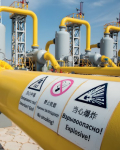
Increase oil production to 100 million tons per year, construct a fourth refinery, and transform the country into a hub for advanced petrochemicals. In an exclusive interview with Petroleum, Yerlan Akkenzhenov, Minister of Energy of the Republic of Kazakhstan, explained how the country intends to transition from being a raw material supplier to a producer of advanced technologies, and why protecting the interests of domestic businesses has become its top priority.
Shell Kazakhstan❜s Country Chair: Purpose-driven leadership in a transforming energy landscape

Exclusive interview for Petroleum Journal with Suzanne Coogan, Country Chair, Shell Kazakhstan.
Ms. Coogan, you recently took on the role of Country Chair of Shell in Kazakhstan. The company is one of the key investors in the country’s oil and gas sector. Could you tell us about your professional journey that led you here?
How the family science festival PRO.NRG reflects educational changes in Kazakhstan

In the context of the recent Presidential Address “Kazakhstan in the Age of Artificial Intelligence: Current Challenges and Their Solutions through Digital Transformation,” the synergy of science, education, and innovation becomes especially important for the country. The annual science festival PRO.NRG contributes to effectively overcoming these challenges. This year, it was held on September 20 in the capital.
Mangystau Region: Facts, Key Projects, and Outlook
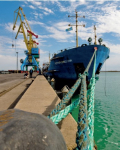
As of the end of 2024, the Republic of Kazakhstan consisted of 17 regions and three cities of republican significance. One of the key regions for the country’s economy is the Mangystau Region, which possesses substantial hydrocarbon resources. Over the past five years, the region’s share of gross regional product (GRP) in Kazakhstan's gross domestic product (GDP) structure has averaged approximately 4.3 percent in value terms.
Free Pricing in Kazakhstan: A New Era Begins for the Central Asian Petroleum Market

As of February 1, 2025, Kazakhstan has officially lifted state regulation of gasoline and diesel fuel prices. This decision marks a turning point in the country’s energy sector and carries far-reaching implications for both the domestic market and the Central Asian region.
Why does the current regulatory model no longer meet the needs of the industry? Historically, regulatory measures have helped contain inflation and maintain social stability. However, this model has long become obsolete and has led to several other problems.
BCC Invest: Your Trusted Partner in the World of Investments

Today, BCC Invest is one of the leading investment companies in the country. Since beginning its operations in 1998, the company has accumulated extensive experience in underwriting, asset management, and brokerage services. Despite the challenging geopolitical and economic environment worldwide, BCC Invest continues to deliver strong financial performance and remains a reliable partner for its clients in the capital markets.
Kazakhstan Diversifies Oil Exports

At the beginning of August 2025, the national company KazMunayGas sent its first shipment of crude oil to Hungary, totalling 85,000 tons. Maritime transportation from the port of Novorossiysk to the Croatian port of Omišalj was carried out by the national carrier Kazmortransflot (a subsidiary of KMG) on its tanker Alatau. From there, the crude was pumped to its final destination, the Százhalombatta Refinery, through the Adriatic pipeline operated by the Croatian company Jadranski naftovod (JANAF).
Kazakhstan❜s Butadiene: Project Progress and Risks

In July 2025, a final investment decision was made to construct a plant for producing butadiene and its derivatives in the Atyrau Region of Kazakhstan. The project, valued at more than $1 bln, is being implemented by the Russian company Tatneft together with the Kazakhstani state fund Samruk-Kazyna and has already received the status of one of the key projects in the country’s industrialization strategy.
Hydrogen in the Spotlight
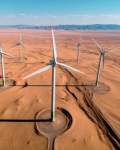
Today, Kazakhstan’s energy balance is almost entirely based on fossil fuels, with coal accounting for 48% of consumption, gas for 26%, and oil for 23.5%. The share of renewables in the energy mix does not exceed 2%. At the same time, the country has set a course for carbon neutrality by 2060 and must adapt to global climate and trade shifts, including the EU’s cross-border carbon regulation.
Oil Chronicles
Oil Chronicles. May 2025
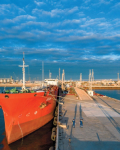
May 1, following a meeting in Abu Dhabi between Askhat Khassenov, CEO of KazMunayGas, and Mohamed Al Shamsi, General Director of AD Ports Group, it was announced that AD Ports had made the investment decision to build two modern container vessels. The vessel design was developed jointly by KazMunayGas and AD Ports, and its capacity will be a record for the Caspian Sea at up to 780 TEU (twenty-foot equivalent unit).
Oil Chronicles. June 2025
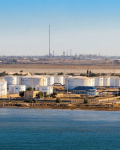
Suzanne Coogan was appointed Senior Vice President and Country Chair of Shell in Kazakhstan. She will assume her duties in Astana starting July 1. Previously, she held the position of Vice President for Exploration in key countries, including Namibia, at Shell Exploration and Production, as well as Vice President for Namibia.
Oil Chronicles. July 2025

July 1, Ardak Kassymbek, the son of Makhmud Kassymbekov, who headed the office of the First President of Kazakhstan, Nursultan Nazarbayev, resigned from the Board of Directors of KazTransOil JSC. He was first elected a member of the Board of Directors in October 2012, following a decision by the company’s sole shareholder, KazMunayGas JSC. At that time, Ardak worked as Deputy Chairman of the Management Board of KazMunayGas for Economics and Finance. For just under 13 years, Ardak Kassymbek represented the interests of KazMunayGas on the KazTransOil Board of Directors.
Legislation
The Inclusion of Dividends in Customs Valuation: Analysis of Legal Practice and Practical Guidance for Importers

Relevance of the Issue
In recent months, customs authorities have increasingly sought to take dividend payments into account when determining the customs value of imported goods. This issue primarily arises in transactions between related parties—for instance, between a Kazakhstani subsidiary-importer and its foreign parent company acting as the supplier. In such cases, scrutiny over the justification of the transaction price is significantly heightened.
Forums
Energy of the Future: Baku Energy Week 2026 – A Strategic Platform for Global Energy Dialogue

The major event of the energy sector — Baku Energy Week — will take place in Azerbaijan for the 31st time on 3–5 June 2026. Over the past three decades, Baku Energy Week has established itself as one of the most significant international gatherings, bringing together leading companies, experts, and investors to discuss current challenges, development prospects, and strategies for the future of the global energy industry. The event plays a crucial role in shaping the international energy agenda.
| © ТОО Издательский дом PETROLEUM. 2000 - 2026 Республика Казахстан 050000 г.Алматы ул. Наурызбай батыра, 58, офис 12 Тел: +7 (727) 258-28-38 Факс: +7 (727) 250-50-82 https://www.petroleumjournal.kz/ | .Без письменного разрешения редакции перепечатка материалов Petroleum не допускается. При использовании материалов активная ссылка на PETROLEUM обязательна. Журнал перерегистрирован в Министерстве информации Республики Казахстан 14 октября 2003 года. Регистрационное свидетельство № 4310–Ж. |

